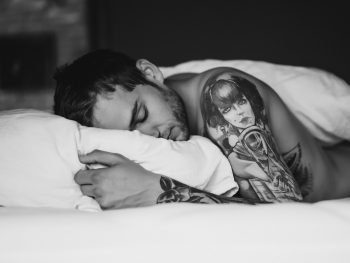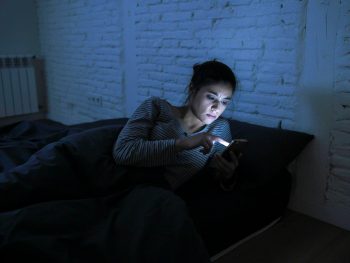Coffee is a great natural booster for our daily lives. Studies prove that drinking coffee gives us many benefits, such as lowering the chances for cancer and other chronic diseases to develop.
It’s also a great way to increase our energy, as it is a stimulant. But stimulants can also make it hard to sleep. If you drink too much coffee, it is very hard to fall asleep. It happens because your body has absorbed too much caffeine, which makes us excited. Relaxing is almost impossible in this state.
However, there is good news for coffee fans like you. It is still possible to enjoy your daily dose of coffee without ruining your sleep.
Keep reading this article to find out the science behind caffeine, and how to contrast its effects naturally.
What Does Caffeine Actually Do?

Caffeine stimulates the brain and central nervous system, giving us a heightened sense of alertness and making us feel more energetic.
When you ingest coffee and it gets absorbed into the bloodstream, it goes to the liver where it gets broken down into its essential components. Caffeine’s primary effect is on the brain, where it blocks the production of adenosine, the hormone that makes us feel tired and relaxed.
That’s what happens when you drink a lot of coffee and feel excited and hyperactive. You are stopping your brain from producing the hormones that relax and make you feel tired.
It sounds like ideal, right? Never feeling tired and ready to take on the world. Well, yes and no. If you’ve drunk too much coffee, you know what it actually means.
The Negative Effects of Caffeine
Caffeine’s negative effects all come from its primary effect: blocking our brain’s production of adenosine, the relaxation hormone.
First off, like any stimulant, you’ll feel miserable once the effects wear down. You risk overworking yourself because you don’t feel tired at all thanks to coffee. This creates a vicious cycle where you feel you need to drink more coffee to combat your tiredness.
It can quickly become an addiction.
Another issue is that caffeine affects sleep. Not only it’s way harder to fall asleep if you drink a lot of coffee, but your sleep’s quality is also affected. You won’t be getting a good night’s sleep if you drink too much coffee during the day.
Last, drinking too much coffee can also affect our heart negatively. It’s all because of the excitement caused by caffeine.
6 Ways to Fall Asleep After Drinking Coffee
Caffeine is great for health and energy, but it also becomes dangerous for your sleep quickly. Poor sleep is associated with many health risks. If you don’t get enough quality sleep, you increase the risks of cardiovascular diseases, dementia, and obesity. It also causes short term issues, such as moodiness and an overall feel of tiredness.
Don’t worry, there are strategies you can start implementing today into your daily life to improve your sleep without renouncing to coffee. At least not entirely.
1. Don’t Consume Caffeine After 12 PM
Our body takes a long time to get rid of the caffeine in it. In fact, it takes between 1.5 and 9.5 hours for our body to remove half of the caffeine inside it. The range might seem excessive, but it depends on each person’s metabolism, and how used they are to drinking coffee.
The more coffee you drink, the more your body becomes tolerant to it, reducing caffeine’s half-life inside our body. There are also genetic factors at play, as well as our liver’s health. A healthy liver reduces caffeine’s half-life greatly, while a damaged one (such as one of a person with hepatitis) can double, or even triple this value.
Assuming you are a healthy person, and that you consume an average amount of caffeine, you can expect most of the caffeine in your body to be gone by 10-11 PM if your last cup was at 12 PM.
And sure, you will have some leftover caffeine left in your body, but it won’t be enough to affect your sleep.
2. Reduce your Caffeine Intake
Simple, right? Just drink less coffee. Easier said than done for some people. How much coffee is the right amount, anyway?
Harvard’s Medical School comes to our help with this study, where it states that you shouldn’t consume more than 400mg of caffeine a day, which is equal to the amount found in four 8-ounce cups of coffee.
Four cups are plenty, so if you drink more than that you should start lowering your caffeine intake by removing the extra cups you drink later in the day.
Editor’s tip: avoid energy drinks at all costs. These are chock-full of caffeine. Or rather, they have as much caffeine as coffee in comparable amounts, but it’s much easier to drink lots of energy drinks rather than lots of coffee.
3. Avoid Activities that Make Sleeping Harder
Coffee isn’t our sleep’s only enemy. If you drink coffee in the evening and also do things that impact your sleep negatively, you’ll find yourself unable to fall asleep.
An example of an activity that could affect your sleep is staring at electronic screens at night. These screens have blue lights, which trick our body into thinking that it’s still daytime. These lights retard the production of melatonin, the sleep-inducing hormone.
Editor’s tip: what if you absolutely must watch screens at night, for example, when you have some extra work to do for the next day?
Every modern electronic screen has a setting that lets you turn off the blue lights after a certain hour. It makes the screen’s colors much harder to distinguish, but it’s still very usable for anything that doesn’t require color precision (sorry to all the digital artists out there). Phones have this option natively coded into their settings.
4. Exercise During the Day
Physical exercise makes sleeping much easier. Something as easy as 30 minutes of moderate exercise a day will drastically improve your sleep. What’s cool is that, because of caffeine, you’ll feel more energized, which makes exercising easier.
You don’t need to do anything crazy. Experts consider a simple 30 minutes walk moderate exercise. You can of course also exercise with higher intensity, it’s up to you. What matters is that you show up to do the work.
Some studies prove that exercise also reduces caffeine’s half-life.
⚠Warning: don’t exercise too hard right before bed. It’s fine to do a workout, but keep the intensity low. If an exercise makes you feel breathless or causes muscle pain it means you are overworking your body.
5. Do Relaxing Activities before Bedtime
While caffeine inhibits our brain’s ability to produce adenosine, it doesn’t block it completely (provided you don’t over consume coffee), so you can still get your brain to produce adenosine by performing relaxing activities in the evening.
Perhaps you could read a book or write a journal, or draw. Other activities that are proven to relax your body are warm showers / baths right before bed, meditation, and yoga.
Remember: electronic screens can worsen the sleep issue, so avoid them. Powerful lights have the same effect. If you can, keep the lighting at a minimum at night. Purchase lower-intensity lights, or regulate them if possible.
6. Replace Coffee with Other Caffeine Products
Some people drink coffee because they like it, but others drink it purely for its effect. If you fall under the second category of people, consider replacing coffee (or energy drinks) with caffeine pills. They’ll give you the same effect, and they are much easier to control.
You can take one pill and be done for the rest of the day. Be warned, though: these are a single powerful hit of caffeine compared to drinking cups of coffee over the day, so you might experience a powerful response when you take one.
Still, they are a great product for people who only care about caffeine’s effects and don’t want to lose its benefits while still cutting on coffees and energy drinks.
Our recommendation: Nutricost Caffeine Pills, 200mg Per Serving (250 Caps)
Conclusions
Coffee is the most popular beverage in the world. If you are a coffee lover, you surely experienced some issues outlined in this article. Luckily for you, most problems stemming from coffee overconsumption can be easily fixed.
If you are used to drinking a lot of coffee though, be prepared to suffer when you reduce your intake. Being a psychoactive substance, it’s not that different from other drugs. Our body will crave it, and it will make you feel miserable if you don’t consume it.
Yes, coffee addiction is a real thing. That’s why I’m warning you about it. If you are addicted to coffee, then what you find in this article can’t really help you.
If that is the case, the first thing you should do is work on your coffee intake.
Are you a coffee lover like me? Do you have issues falling asleep? Implement the strategies I’ve told you about in this article, and enjoy a better quality of life!





Leave a Reply